When it comes to Swiss mountain dogs, there are two main types that people tend to think of: the Greater Swiss Mountain Dog and the Bernese Mountain Dog.
Both dog breeds are popular among pet lovers, but which one is the better choice for you?
In this blog post, we will compare these two dog breeds in detail so that you can make an informed decision.
We will look at their physical characteristics, temperaments, and other important factors to help you decide which breed is right for your lifestyle.
Bernese Mountain Dog vs Greater Swiss Mountain Dog: Breeding History Compared
The Bernese Mountain Dog is a relatively new breed, having been developed in the 1800s in the Swiss Alps. The Greater Swiss Mountain Dog, on the other hand, is an ancient breed that has been around for centuries.
The Bernese Mountain Dog (also known as “Berners”) was originally bred as a working dog. They were used for tasks such as pulling carts and herding dairy cattle.
In a similar fashion, the Greater Swiss Mountain Dog was also originally bred as a working dog. However, their tasks were mainly focused on guarding property and defending flocks of sheep.
Today, both breeds are popular as family pets. They are both loyal and affectionate dogs that make great companions.
However, the two breeds have some key differences, as outlined throughout this article.
Bernese Mountain Dog vs Greater Swiss Mountain Dog: Size Compared
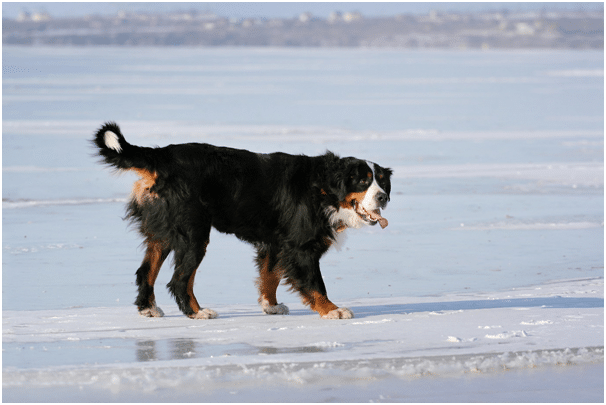
The Bernese Mountain Dog is a large breed, with males weighing in at around 90 – 110 pounds. Whereas, females weigh around 80 – 105 pounds.
Their height is around 24 – 28 inches tall for males, and 23 – 27 inches tall for females.
The Greater Swiss Mountain Dog is even larger, weighing in at around 140 pounds and between 23 – 28 inches tall.
You may also like – Bernese Mountain Dog Vs St. Bernard Dog
Bernese Mountain Dog vs Greater Swiss Mountain Dog: Coat Type & Color Compared
Both the Bernese Mountain Dog and Greater Swiss Mountain Dog have double coats.
The Bernese Mountain Dog’s outer coat is long, straight, and coarse, while the undercoat is dense and soft.
Berners are known for their tricolor coats, which are black with rust and white markings.
The Greater Swiss Mountain Dog’s coat is also double, but the outer coat is shorter and not as coarse as the Bernese Mountain Dog’s. The undercoat is thick and dense.
The most common color for the Greater Swiss Mountain Dog is black. However, they are also known to come in red, rust, or tan.
Bernese Mountain Dog vs Greater Swiss Mountain Dog: Temperament Compared
Both the Bernese Mountain Dog and Greater Swiss Mountain Dog are gentle, calm, and loyal dogs that make great family pets. They are both good with children and other animals.
The Bernese Mountain Dog is slightly less active than the Greater Swiss Mountain Dog, but they still need plenty of exercise and mental stimulation.
Known as intelligent dogs that are easy to train, they have an affectionate temperament.
Greater Swiss Mountain Dogs are a very active breed that needs a lot of exercise.
They are also intelligent dogs that are easy to train. However, they can be stubborn and headstrong, so patience is required when training them.
Bernese Mountain Dog vs Greater Swiss Mountain Dog: Protectiveness Compared
Both the Bernese Mountain Dog and Greater Swiss Mountain Dog are protective of their families.
They will bark to alert you if someone is approaching, but they are not aggressive dogs.
The Bernese Mountain Dog is known to be more reserved around strangers. Whereas the Greater Swiss Mountain Dog is more outgoing.
However, both breeds need socialization from a young age to ensure that they are comfortable around people.
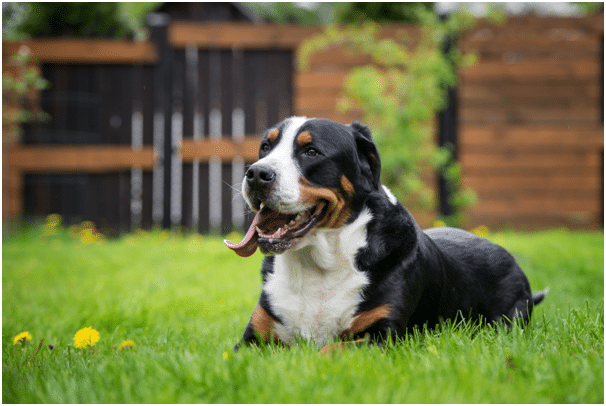
Bernese Mountain Dog vs Greater Swiss Mountain Dog: Training Needs Compared
The Bernese Mountain Dog is a laid-back breed that is easy to train. They are typically eager to please their owners and respond well to positive reinforcement.
In contrast, the Greater Swiss Mountain Dog is a more independent breed that can be stubborn and headstrong.
They require a patient owner who is willing to put in the time and effort to train them properly.
With consistent training, both breeds can be well-behaved members of the family. However, those looking for an easier-going dog may want to opt for the Bernese Mountain Dog.
Obedience training
When it comes to obedience training, both Bernese Mountain Dogs and Greater Swiss Mountain Dogs are notoriously stubborn.
However, there are a few key strategies that can help owners to successfully train their dogs.
First, it is important to be consistent with commands and rewards.
Dogs thrive on routine, so sticking to the same commands and offering rewards at the same time each day will help them to better understand what is expected of them.
Additionally, it is important to use positive reinforcement rather than punishment when training.
Dogs respond much better to rewards than they do to punishment. So taking the time to praise your dog when they follow a command will be more effective than scolding them when they don’t.
Finally, remember that patience is key when training any dog. Dogs learn at their own pace. Forcing them to learn too quickly will only lead to frustration on both your part and theirs.
With consistent training, both Bernese Mountain Dogs and Greater Swiss Mountain Dogs can be well-mannered companions.
Socialization
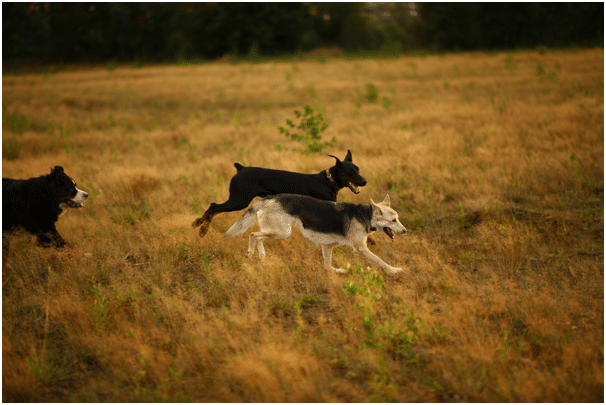
Socialization is important in raising any dog. It is especially important for Bernese Mountain Dogs and Greater Swiss Mountain Dogs.
These breeds are known for being aloof and suspicious of strangers. It is therefore important to introduce them to new people and new situations from a young age.
The best way to socialize your dog is to expose them to as many new people, places, and experiences as possible.
Take them for walks in different neighborhoods. Introduce them to new friends and family members. Sign them up for obedience classes or dog socialization groups.
The more they are around new people and new situations, the more comfortable they will feel.
With proper socialization, Bernese Mountain Dogs and Greater Swiss Mountain Dogs can be friendly, outgoing dogs.
Bernese Mountain Dog vs Greater Swiss Mountain Dog: Exercise
Both the Bernese Mountain dog and the Greater Swiss Mountain dog are large, strong breeds that were originally bred for working on farms.
Today, they are popular pets that are known for their gentle dispositions and loyalty.
When it comes to exercise, both breeds need plenty of daily activity to stay healthy and happy, whilst avoiding unnecessary weight gain.
A good way to provide this exercise is by taking them on long walks or runs, letting them play in a fenced-in yard, or enrolling them in a dog sport such as agility training.
Swissies and Berners also enjoy hiking and swimming, so these activities can be great ways to bond with your pet while getting some fresh air and exercise.
No matter what type of activity you choose, it’s important to make sure your dog is getting a good deal of exercise to stay healthy and fit.
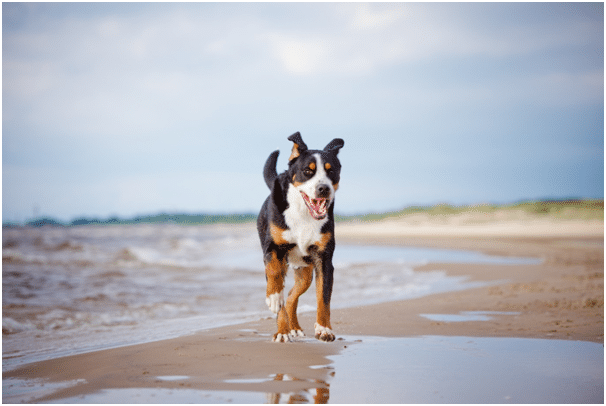
Mental Stimulation
In addition to physical exercise, both Bernese Mountain Dogs and Greater Swiss Mountain Dogs need plenty of mental stimulation.
These breeds are known for being intelligent and independent, so they need mentally stimulating activities to keep them from becoming bored or destructive.
Some great ways to provide mental stimulation for your dog include teaching them new tricks, playing interactive games such as fetch or tug-of-war, and giving them puzzle toys to figure out.
Mental stimulation is just as important as physical exercise for keeping your dog happy and healthy.
Failing to provide this may result in destructive behavior from either breed.
Bernese Mountain Dog vs Greater Swiss Mountain Dog: Nutrition Needs Compared
Bernese Mountain Dogs and Greater Swiss Mountain Dogs are large, muscular breeds that need a diet high in protein to maintain their health.
The best way to ensure your dog is getting enough protein is to feed them commercial dog food that is made with high-quality ingredients.
You should also avoid giving your dog table scraps, as this can lead to weight gain and other health problems.
In addition to protein, Bernese Mountain Dogs and Greater Swiss Mountain Dogs need plenty of other nutrients to stay healthy.
Some of the most important nutrients for these breeds include vitamins, minerals, essential fatty acids, and antioxidants.
You can provide these nutrients to your dog by feeding them a well-balanced diet of commercial dog food, supplements, and fresh foods.
By ensuring your dog is getting all the nutrients they need, you can help them stay healthy and happy for years to come.
Bernese Mountain Dog vs Greater Swiss Mountain Dog: Grooming Needs Compared
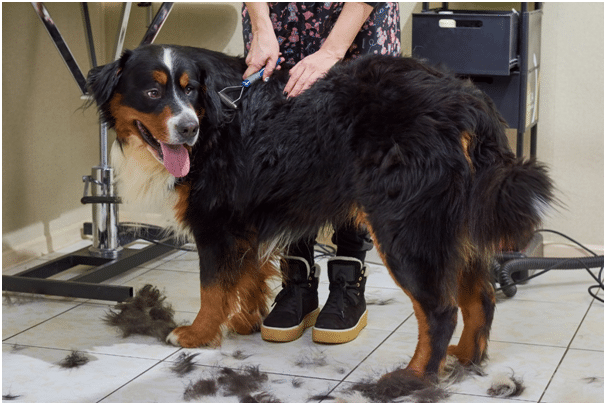
Shedding potential?
The Bernese Mountain Dog is a moderate shedder while the Greater Swiss Mountain Dog sheds minimally.
Both breeds will require regular brushing to help control shedding and keep their coats looking healthy.
Bernese Mountain Dogs have long, thick fur that can become matted if it’s not brushed regularly.
Greater Swiss Mountain Dogs have shorter fur that is less likely to mat, but they will still benefit from regular brushing.
Other Grooming needs
In addition to brushing, both breeds will need to have their nails trimmed monthly.
Bernese Mountain Dogs and Greater Swiss Mountain Dogs are also known for drooling, so it’s important to keep a cloth or handkerchief nearby to wipe up any drool that may accumulate.
Overall, both breeds are easy to groom and only require moderate maintenance.
Bernese Mountain Dog vs Greater Swiss Mountain Dog: Barking Levels Compared
Both Bernese Mountain Dogs and Greater Swiss Mountain Dogs are known for being quiet, gentle breeds.
They are not known for having a booming bark, although they may occasionally bark when they are excited or agitated.
If you are looking for a very quiet breed with nice temperaments, then either of these two breeds would be a good choice.
Bernese Mountain Dog vs Greater Swiss Mountain Dog: Adaptability to Weather Extremes Compared
Both Bernese Mountain Dogs and Greater Swiss Mountain Dogs are breeds that originated in cold, mountainous regions.
As such, they are both very well-adapted to cold weather and can easily tolerate extreme temperatures.
That being said, these breeds should not be left outside in cold weather for extended periods of time. This is because they are not immune to frostbite or other cold-weather injuries.
In addition, both breeds should have access to shelter when they are outside in the cold. This will help them stay warm and dry.
While Bernese Mountain Dogs and Greater Swiss Mountain Dogs are well-adapted to cold climates, they are not as tolerant of heat.
These breeds should be kept cool in the summer months, as they are susceptible to heat stroke.
Overall, both Bernese Mountain Dogs and Greater Swiss Mountain Dogs are adaptable to different weather conditions.
However, they should be protected from extremes of both cold and heat.
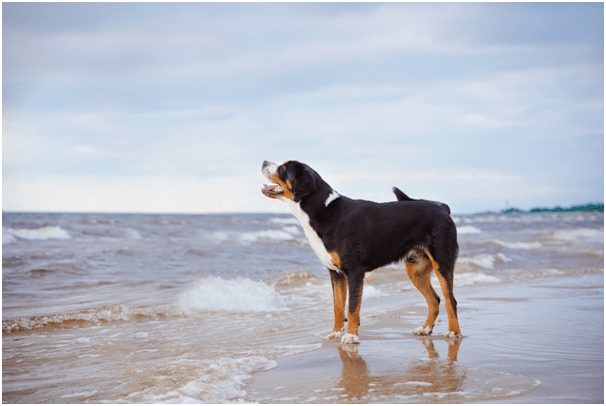
Are both breeds Good with Other Dogs?
Yes, both Bernese Mountain Dogs and Greater Swiss Mountain Dogs are generally good with other dogs.
However, it is important to introduce them to other dogs at an early age so that they can socialize properly.
If you do not socialize your dog from a young age, they may be suspicious or even aggressive towards other dogs when they meet them later in life.
Both Bernese Mountain Dogs and Greater Swiss Mountain Dogs are quite tolerant of small and large dogs.
They may be a bit more cautious around small dogs, but they should not show any aggression towards them
Both breeds are generally good with other dogs and make great companions.
Are Bernese Mountain Dogs Good with Children?
Yes, Bernese Mountain Dogs are typically good with children. They are patient and affectionate, which makes them ideal playmates for kids.
However, it’s important to socialize them early on so that they’re comfortable around people of all ages. Otherwise, they may be hesitant or even fearful around unfamiliar faces.
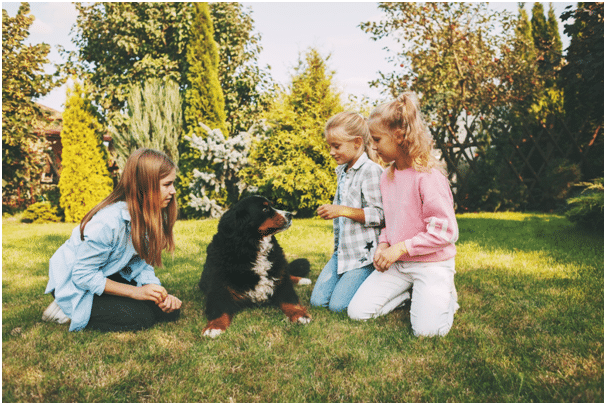
Are Greater Swiss Mountain Dogs Good with Children?
Greater Swiss Mountain Dogs are generally a good choice of dog for kids. They are a calm and gentle breed, but they may be too large and exuberant for very small children.
It is important to always supervise your dog around children and teach them both how to interact with each other safely.
This is because, despite their good nature, Greater Swiss Mountain Dogs are still dogs, and any dog has the potential to bite or knock over a child if they are not properly trained and supervised.
If you have small children, it is important to socialize your Greater Swiss Mountain Dog from a young age. This is so they are used to being around small children and know how to behave around them.
You should also teach your children how to interact with dogs safely. This will help them understand not to bother or startle the dog, and to always ask an adult before approaching a new dog.
Bernese Mountain Dog vs Greater Swiss Mountain Dog: Health Issues Compared
Both Bernese Mountain Dogs and Greater Swiss Mountain Dogs are generally healthy breeds.
However, there are some health conditions to be aware of if you are considering either of these breeds.
The most common health problems for Bernese Mountain Dogs include elbow and hip dysplasia, cancer, and gastric torsion (bloat).
Elbow and hip dysplasia are both hereditary conditions that can cause joint pain and lameness.
Cancer is also a serious health concern for Bernese Mountain Dogs, and this breed is particularly susceptible to certain types of cancer, such as lymphoma and mast cell tumors.
Gastric Torsion (bloat) is another genetic predisposition that Bernese Mountain Dogs are prone to.
This is a condition where the stomach twists and fills with gas, which can be fatal if not treated immediately.
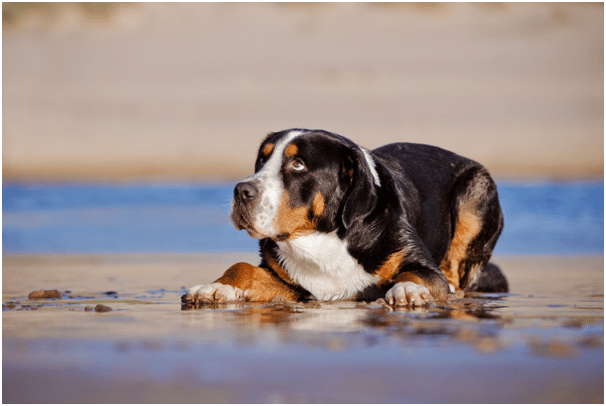
The most common health problems for Greater Swiss Mountain Dogs include hip dysplasia, elbow dysplasia, and cancer.
Like Bernese Mountain Dogs, Greater Swiss Mountain Dogs are also susceptible to certain types of cancer, such as lymphoma and mast cell tumors.
Hip and elbow dysplasia are both hereditary conditions in this breed, that can cause joint pain and lameness.
In general, both Bernese Mountain Dogs and Greater Swiss Mountain Dogs are healthy breeds, but there are numerous health conditions to be aware of.
If you are considering either of these breeds, be sure to talk to your vet about the specific health concerns of each breed.
You should also make sure that you purchase your dog from a reputable breeder who can provide health clearances for the parents of your puppy.
Health clearances prove that a dog has been tested for and cleared of a particular condition.
You can also talk to your breeder about the specific health concerns of each breed so that you can make an informed decision about which breed is right for you.
Bernese Mountain Dog vs Greater Swiss Mountain Dog: Life Expectancy Compared
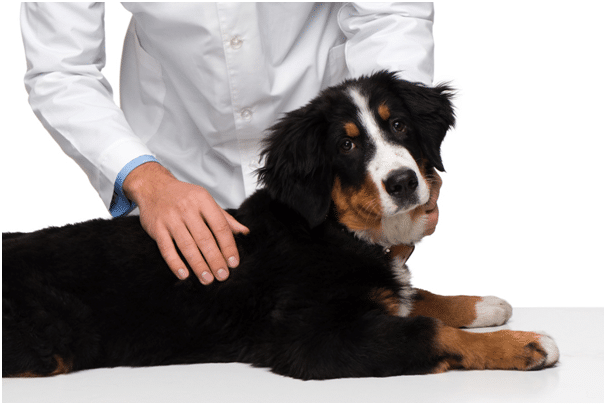
Bernese Mountain Dogs have a life expectancy of 8-10 years, while Greater Swiss Mountain Dogs have a life expectancy of 10-12 years.
Both breeds are relatively long-lived for dogs, but the Greater Swiss Mountain Dog has a slightly longer lifespan.
This is likely because Bernese Mountain Dogs are more prone to certain health conditions, such as cancer, than Greater Swiss Mountain Dogs.
Of course, the life expectancy of any individual dog will depend on several factors, including diet, exercise, and genetics.
If you are considering either of these breeds, be sure to talk to your vet about the best way to ensure your dog’s long and healthy life.
Bernese Mountain Dog vs Greater Swiss Mountain Dog: Prices Compared
Bernese Mountain Dogs typically cost between $1,200 and $2,000, while Greater Swiss Mountain Dogs typically cost between $1,500 and $2,500.
The price of a Bernese Mountain Dog or Greater Swiss Mountain Dog will depend on several factors, including the breeder’s reputation, the dog’s pedigree, and the dog’s conformation (physical appearance).
Generally speaking, Bernese Mountain Dogs are less expensive than Greater Swiss Mountain Dogs.
This is likely due to the fact that Bernese Mountain Dogs are more common than Greater Swiss Mountain Dogs.
When choosing a Bernese Mountain Dog or Greater Swiss Mountain Dog, be sure to talk to your breeder about the dog’s health clearances and pedigree.
These factors will help you determine whether the dog is a good fit for you and your family.
Bernese Mountain Dog vs Greater Swiss Mountain Dog – AKC Recognition
The Bernese Mountain Dog was recognized by the AKC in 1937, while the Greater Swiss Mountain Dog was recognized by the AKC in 1995.
The Bernese Mountain Dog is a more common breed than the Greater Swiss Mountain Dog, and this is likely because the Bernese Mountain Dog has been recognized by the AKC for a longer period of time.
If you are considering either of these breeds, be sure to research the breed standards set by the AKC to find breeder-producing dogs that meet your expectations.
You may also like – Bernese Mountain Dog vs Australian Shepherd – Compared!
Final Thoughts
In closing, Bernese Mountain Dogs and Greater Swiss Mountain Dogs are two very different breeds.
Bernese Mountain Dogs are typically less expensive than Greater Swiss Mountain Dogs but have a shorter lifespan.
Both breeds are recognized by the AKC, but Bernese Mountain Dogs have been recognized for a longer period of time.
You should also make sure that you purchase your dog from a reputable breeder who can provide you with the dog’s health clearances and pedigree.
Doing your research before you purchase a Bernese Mountain Dog or Greater Swiss Mountain Dog will help you find the right dog for you and your family.


